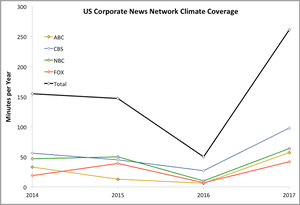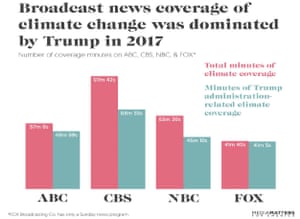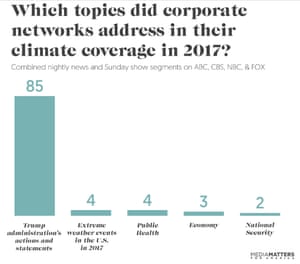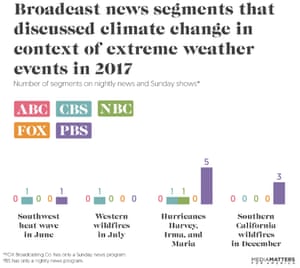
In 2016, US TV network news coverage of climate change plummeted. News coverage was focused on the presidential election, but the corporate broadcast networks didn’t air a single segment informing viewers how a win by Trump or Hillary Clinton could affect climate change or climate policy. That followed a slight drop in news coverage of climate change in 2015, despite that year being full of critical events like the Paris climate accords, Clean Power Plan, and record-breaking heat.
The good news is that the annual analysis done by Media Matters for Americafound that in 2017, network news coverage of climate change soared.

The bad news is that most of it was focused on Trump’s historically stupid withdrawal from the Paris climate agreement.

All Trump, all the time
Media Matters found that in 2017, 79% percent of the time that corporate broadcast networks spent covering climate change featured actions or statements by the Trump administration. Trump’s withdrawal from the Paris climate agreement was featured in 52% of climate news segments.

The administration also brought climate denial into the news cycle. Of the network news climate segments last year, 19% mentioned that Trump has called climate change a “hoax,” and 37% of those didn’t rebut the claim.
Many statements by the administration have focused on manufacturing doubt about human-caused global warming. For example, in a June 4 segment on CBS’ Face the Nation, when asked about Trump’s “hoax” comments, his U.N. Ambassador Nikki Haley dodged the question by saying:
The president believes the climate is changing, and he does know that pollutants are a part of that equation.
Other members of the administration like Scott Pruitt have similarly cast doubt on the fact that humans are the dominant cause of current climate change.
This happened in a year filled with expensive climate-fueled disasters including hurricanes, droughts, heatwaves, and floods. The corporate broadcast networks – ABC, CBS, NBC, and FOX – aired just four total segments that discussed these events in the context of climate change.

PBS still has the best climate reporting
By contrast, PBS aired 8 news segments discussing the link between climate change and the extreme weather events of 2017. Like the previous year, PBS had far more overall climate change coverage than the corporate news networks. PBS NewsHour interviewed or quoted more scientists in its climate coverage than all the other networks combined – 29 scientists, compared to a total of 27 scientists for the others (14 on CBS, 10 on NBC, 3 on ABC, and none on FOX). PBS NewsHour also featured the highest number of climate change segments (69), followed by CBS Evening News (44), NBC Nightly News (27), and ABC’s World News Tonight (23).
It’s thus perhaps unsurprising that Trump’s proposed budget would eliminate federal funding for PBS.

CBS was the best corporate news network in its climate change reporting, with CBS Evening News providing more coverage (90 minutes) than NBC Nightly News and ABC World News Tonight combined. About two-thirds of CBS’ climate coverage was focused on the Trump administration’s actions. That left just 30 minutes of CBS’ 2017 climate coverage devoted to topics like extreme weather events, and even less on NBC (20 minutes), ABC (7 minutes), and FOX (1 minute).
News networks still need better climate reporting
Trump’s decision to withdraw from the Paris climate agreement certainly merited widespread news coverage, and received it with 62 total segments on the corporate networks plus an additional 23 on PBS. The administration’s attacks on the Clean Power plan (9 corporate network segments plus 7 on PBS) and other environmental regulations (10 corporate network segments plus 16 on PBS) arguably deserved a similar level of attention.
While the surge in news coverage of climate change is encouraging, the networks shouldn’t rely so heavily on the Trump administration’s damaging actions in reporting on the subject. Certainly, non-Trump related events linked to climate change like the record hurricanes, droughts, heatwaves, and floods should be the subject of far more news segments.
source:-.theguardian.


